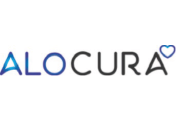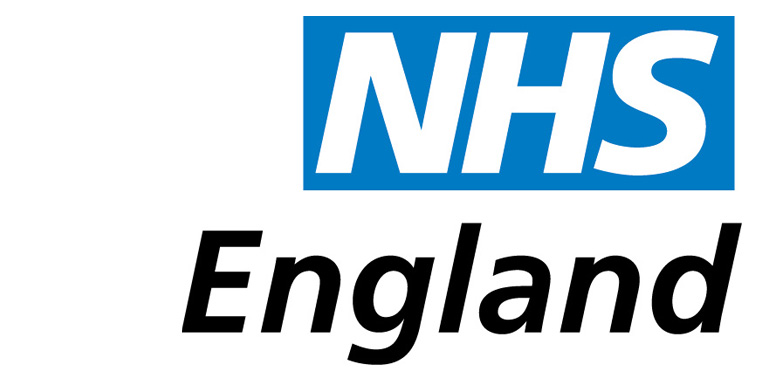Treat yourself, with Paul Plumbley’s delicious Lockdown M.F.C. (My Life Fried Chicken!)
Posted on Wednesday, May 27th, 2020
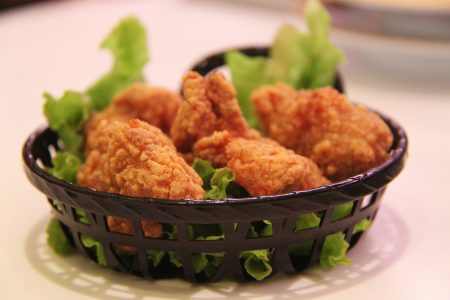
It might not be possible to get a KFC at the moment, but worry not, The Stable Door Café’s Paul Plumbley has rustled up this recipe to make your very own, at home.
Why not try making some rainbow slaw and authentic wedges too? Paul has it all here for you!
Paul says: “If you’re missing the Colonel’s chicken because of lockdown, why not try our ‘My Life Fried Chicken?’ It’s fantastic with Teresa from Day Opportunities’ freshly picked salad and some purple cabbage slaw – why not cook some of our potato wedges for with it, for you very own ‘fakeaway?’”
My Life Fried Chicken
Please note that the allergens for this recipe are milk and flour.
Ingredients:
- 8 chicken thighs
- 500ml buttermilk
- 1tsp salt
- 2tsp paprika
- 1tsp chilli powder
For the coating:
- 250g plain flour
- 2tsp thyme
- 2tsp oregano
- 1tsp celery salt
- 1tsp black pepper
- 3tsp sweet paprika
- 1tsp dried mustard
- 2 tsp garlic salt
- 1tsp ground ginger
- 1tsp dried basil
- 1tsp white pepper
- 1tsp chilli powder
Method:
- Mix the buttermilk with the paprika, salt and chilli (from the first section of ingredients).
- Place the chicken thighs into the buttermilk mix, making sure they are completely covered and marinate over night.
- Mix the plain flour with all the other herbs and spices.
- One at a time, coat the chicken in the spiced flour, making sure it is completely covered with lots of the spicy mix.
- If you have a deep fryer, heat to 150c, if not, use a heavy frying pan 1/3rd filled with oil and heat on a medium high heat.
- Cooking two at a time, place in the hot oil and cook for three minutes each side, then place on a wire tray or oven rack or cooling rack, so the oil can drain.
- Pre heat the oven to 170c.
- Cook the chicken on the wire rack with a baking tray underneath to catch any oil that drips and cook for 10 minutes. Check that this is cooked all the way through.
- Leave to stand for five minutes then eat.
Rainbow slaw
Please note that the allergens for this recipe are eggs and mustard.
Ingredients:
- 1 quarter red cabbage
- 2 carrots, peeled
- 3 spring onions
- 1 large gherkin
- 2 dsp mayonnaise
- 1 tsp fennel seeds (optional)
- A pinch of black pepper
- A pinch of salt
- Thinly slice the red cabbage and spring onion.
- Grate the carrot and gherkin and mix all of these together.
- If you’re using the fennel seed, toast in a dry pan, then add.
- Mix two large spoons of mayonnaise and the salt and pepper into the mix and stir well.
Wedges
Ingredients:
- 4 jacket potatoes
- 2dsp vegetable oil
- 3tsp paprika
- 1tsp curry powder
- 1tsp salt
Method:
- Mix the oil and spices together in a large bowl.
- Cut each potato in half, then each half into three or four wedges.
- Put the wedges into the bowl with the oil and mix well.
- Heat the oven to 170c.
- Place the wedges skin side down, evenly spread out on a baking tray, and cook for 45 minutes.
My Life’s Day Opportunities bring cheer with veg bags and help member Richard rekindle his youth!
Posted on Wednesday, May 27th, 2020
Day Opportunities Standish remains open for members that are still attending, following the social distancing guidance. To give people in the community that extra bit of cheer, our teams and volunteers have been picking and making home grown veg bags to deliver as freebies to people receiving our hanging baskets.
We have also been helping our member Richard rekindle his youth. Here he is below, aged around two, helping his grandad to plant potatoes.

We thought it might be a nice idea to drop some potatoes off to him, so that he can have a go again, all these years later – we’re looking forward to seeing if you’ve still got those green fingers, Richard!
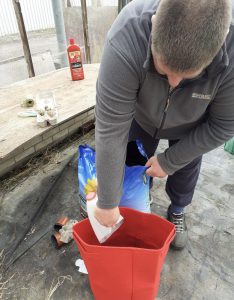
Unexpected kindness is the most powerful, least costly and most underrated agent of human change…
Posted on Wednesday, May 27th, 2020
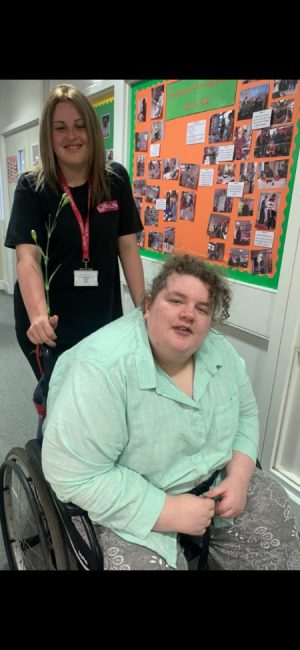
Last week, whilst getting some fresh air and having a walk, My Life’s Liz and Anais were stopped by a lady who thanked Liz for being a keyworker, told her that she was doing a wonderful job and gave her some flowers from the bunch that she was carrying.
Our spirits were all buoyed by this lovely story, which made us remember the importance of small, genuine acts of kindness. It made us realise that when we’re under pressure it can be easy to forget how important it is to be kind – especially to ourselves.
We know that many people are doing the difficult job of juggling work whilst caring for others at the moment, so we thought we’d share this excellent blog from the Social Care Institute for Excellence, which gives tips on how to be kind to others AND our very own selves, whilst at work during the lockdown.
COVID-19 detection dogs trial launches
Posted on Tuesday, May 26th, 2020
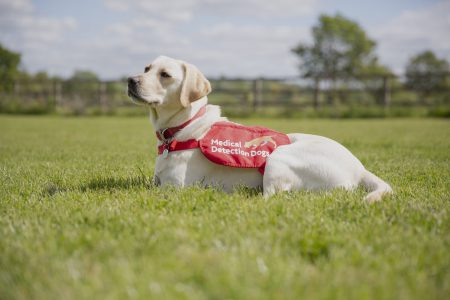
Trials for specially-trained ‘COVID dogs’ that may be able to detect coronavirus (COVID-19) in humans, even before symptoms appear, are set to begin as part of new research.
This will establish whether they could be used as a potential new non-invasive, early warning measure to detect coronavirus in the future.
World-leading researchers at the London School of Hygiene and Tropical Medicine (LSHTM) will carry out the first phase of a trial in collaboration with the charity Medical Detection Dogs and Durham University, backed by £500,000 of government funding. This aims to determine whether dogs are able to detect coronavirus in humans from odour samples.
The trial brings together leading disease control experts from the universities with Medical Detection Dogs, who have already successfully trained dogs to detect the odour of many different diseases in humans, such as cancer, malaria and Parkinson’s disease.
This new trial will look at whether the dogs, a mixture of labradors and cocker spaniels, can be trained to detect coronavirus in people too, even if they are not showing symptoms.
Minister for Innovation Lord Bethell said:
“Bio-detection dogs already detect specific cancers and we believe this innovation might provide speedy results as part of our wider testing strategy. Accuracy is essential so this trial will tell us whether ‘COVID dogs’ can reliably detect the virus and stop it spreading.”
If successful, these dogs could provide a fast and non-invasive detection method alongside the government’s robust 5-pillar testing strategy. It is one of a number of testing measures being explored in order to ensure the government’s response to the virus is as extensive as possible.
The initial phase of the trial will see NHS staff in London hospitals collect odour samples from people who are infected with coronavirus and those who are uninfected. The six bio detection dogs will then undergo thorough training to identify the virus from the samples.
More than 10 years of research gathered by Medical Detection Dogs has shown that the dogs, which could each screen up to 250 people per hour, can be trained to detect the odour of disease at the equivalent dilution of one teaspoon of sugar in 2 Olympic-sized swimming pools of water.
Professor James Logan, lead researcher for the work and Head of the Department of Disease Control at the London School of Hygiene and Tropical Medicine, said:
“Our previous work has shown that malaria has a distinctive odour, and with Medical Detection Dogs, we successfully trained dogs to accurately detect malaria. This, combined with the knowledge that respiratory disease can change body odour, makes us hopeful that the dogs can also detect COVID-19.
I would like to thank the UK government for their support of this pioneering research through this funding. We’re excited to do this trial, and confirm whether these bio detection dogs can be used to screen for COVID-19. If successful, this approach could revolutionise how we detect the virus, with the potential to screen high numbers of people.”
Medical Detection Dogs and the universities put forward a proposal for the clinical trial to the government, which has been accepted following strong evidence that the dogs can detect other diseases in humans with a high level of accuracy.
The dogs will only be deployed if backed by strong scientific evidence and is part of the government’s approach to explore all possible options to tackle coronavirus.
Dr Claire Guest, Co-founder and CEO of Medical Detection Dogs, said:
“We are delighted that the government has given us the opportunity to demonstrate that dogs can play a role in the fight against COVID-19. They have the potential to help by quickly screening people, which could be vital in the future.
We have already demonstrated our expertise in canine disease detection by successfully training dogs to detect diseases like cancer, Parkinson’s and malaria, and we apply that same science to train life-saving Medical Alert Assistance Dogs to detect odour changes in individuals caused by their health condition.
We are sure our dogs will be able to find the odour of COVID-19 and we will then move into a second phase to test them in live situations, following which we hope to work with other agencies to train more dogs for deployment. We are incredibly proud that a dog’s nose could once again save many lives.”
Changes secured to Covid-19 Hospital Visitors Guidance after concerns over equal access to healthcare for disabled people
Posted on Tuesday, May 26th, 2020

Mark Williams, a Bristol based disability rights campaigner and one of the founders of Bristol Reclaiming Independent Living (BRIL) has welcomed the response received to his ‘Pre-Action’ letter, sent by his legal team to NHS England and the North Bristol and University Hospitals Bristol NHS Trusts following concerns over their strict policies for hospital visitors during the Coronavirus pandemic.
Mr Williams has had athetoid cerebral palsy since birth which means he has no control over his limbs and requires 24-hour support. He also has extreme difficulty controlling the muscles of his lips, tongue, palate and larynx, resulting in very distorted speech which means that someone unfamiliar to him would only understand about 10% of his speech. This is made worse in situations where there is background noise and emotions are heightened. He relies on his team of personal assistants who are paid using a direct payment from Bristol City Council, to be able to communicate everything that he says.
He was anxious that if he needs to be admitted to hospital during the current COVID-19 pandemic, the visitor policies that were in place for both Southmead and the BRI (which are drawn from the NHS England guidance) would not allow his carers to attend with him to make sure he was able to communicate with doctors.
Mr Williams’ lawyers argued that visitor policies were discriminatory as they failed to make reasonable adjustments for disabled people with communication needs and were in breach of Mr William’s human rights.
In a response to the letter before action from NHS England received today, they have said:
“NHS England agrees to amend and re-issue its Visitor Guidance dated 8 April 2020 (Publications approval reference: 001559). The amendment will be made as soon as possible and will address your client’s concerns…In the meantime, and for the avoidance of doubt, NHS England confirms that the Visitor Guidance is not intended to prevent providers from complying with their legal duties under the Equality Act 2010”.
Mr Williams said:
“The idea of being in hospital and not being able to communicate with hospital staff; to tell them how I am feeling or ask them questions about what treatment they have planned, was terrifying. I knew it was important to take this action not just for me, but for all other people with communication and sensory needs that were facing similar worries. I would like to thank NHS England for listening to my concerns and agreeing to make changes to their guidance so quickly.”
In addition, Mr Williams has received responses from both Hospital Trusts in Bristol confirming that he will be able to be supported by his PAs in the event that admission to hospital is required. They have also confirmed that they will be reviewing and amending their local policies.
Polly Sweeney, partner at specialist public law and human rights firm Rook Irwin Sweeney who represented Mr Williams on a Pro Bono basis, added:
“Our client would wish to acknowledge in particular the response received from the North Bristol NHS Trust which has provided him with a great deal of comfort that his concerns have been properly and respectfully taken on board.
Whilst the responses of all the public bodies are welcomed, this case acts as an important reminder that even in these emergency times it is essential that there is consultation with the public and representative groups before policies are published so to avoid steps like these having to be taken.”
Finding your current situation stressful? Try these Mindfulness exercises to help reduce any tensions
Posted on Tuesday, May 26th, 2020

The pandemic has brought many changes to our lives. For some of us, this has increased our stress levels.
Changes to routine, not being able to go out enough, going to work through the pandemic, or not being able to work and see our friends, we all have different challenges to face and we all respond differently to them.
If you’re finding things hard, or simply want some time for yourself, why not try this mindfulness audio exercise? At only three minutes long, you can try fitting it into your day.
Or how about the following mindfulness exercises? All are designed to help you take a moment, slow down and try to alleviate some of those stresses and tensions. Thank you to My Life’s Dawn for sharing them with us.
With all of the exercises, remember to engage each of your senses and to take your time. The text following each exercise just scratches the surface. Go deeper and make the exercise your own!
During your practice, when judgements, other thoughts, or any other distractions occur, do not fuss over them, but gently turn your attention back to the exercise.
Explore a fruit
Take an orange, or other fruit and observe, describe and explore it. What are the visual features, what does it feel like, and what does it smell like? Now, slowly start to peel the orange and continue to tune in to each sense. Notice any emotions, thoughts, or other experiences that you have during this process, but cling to nothing, instead staying engaged in the activity. Ultimately, you may choose to mindfully eat the orange.
Connect with a sound
Put on music, listen to the sounds of waves, nature, or another soothing sound, or pick up on the naturally occurring sounds around you (the hum of an appliance, the sound of traffic, or the bustle of a workplace). Close your eyes and tune in to your chosen sound. Stay with the sound, returning to it when a distraction happens, and perhaps notice how you breathe along with it.
Create a safe place
In your mind, create a place that is safe and comfortable. It may be a room, a cabin in the woods, or an imaginary land where you are protected by fire-breathing dragons! Use your senses to fully enter the safe place. Notice how it looks, paying attention to even the smallest details. Notice the sounds, or the silence. How does it feel? Stay in this place for a while and go there whenever you need to soothe and calm yourself.



